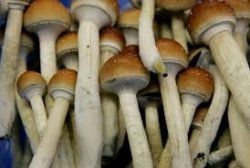Can Mushrooms Treat Depression?

Can Mushrooms Treat Depression?
I TRIED magic mushrooms out of curiosity and in middle age. I’d been on the amateur mycological circuit for a couple of years, but hallucinogenic species were rarely mentioned at the foraging expeditions and conferences I attended. It’s almost as if they were the black sheep of mycology: embarrassing to serious taxonomy jocks. I read some books on the subject, but most were tripper’s guides that didn’t utilize, um, specific language or current science. Psychoactive mushrooms had been in a kind of scientific ghetto ever since they were criminalized in 1968. But now the drug derived from the mushroom, psilocybin, is finally being re-examined for its medical applications.
A study published last month in the Journal of the Royal Society Interface compared M.R.I.s of the brains of subjects injected with psilocybin with scans of their normal brain activity. The brains on psilocybin showed radically different connectivity patterns between cortical regions (the parts thought to play an important role in consciousness). The researchers mapped out these connections, revealing the activity of new neural networks between otherwise disconnected brain regions.
The researchers suspect that these unusual connections may be responsible for the synesthetic experience trippers describe, of hearing colors, for example, and seeing sounds. The part of the brain that processes sound may be connecting to the part of the brain that processes sight. The study’s leader, Paul Expert at King’s College London, told me that his team doubted that this psilocybin-induced connectivity lasted. They think they are seeing a temporary modification of the subject’s brain function.
The fact that under the influence of psilocybin the brain temporarily behaves in a new way may be medically significant in treating psychological disorders like depression. “When suffering depression, people get stuck in a spiral of negative thoughts and cannot get out of it,” Dr. Expert said. “One can imagine that breaking any pattern that prevents a ‘proper’ functioning of the brain can be helpful.” Think of it as tripping a breaker or rebooting your computer.
Psilocybin is present in a wide range of mushrooms, especially in the genus Psilocybe, though why it exists in the mushroom is not fully understood. When ingested, psilocybin metabolizes to psilocin, which resembles the chemical structure of serotonin — a neurotransmitter that regulates mood, appetite, sleep, cognitive functions like memory and learning and feelings of pleasure. Psilocin may simulate serotonin, and stimulate serotonin receptors in the brain.
Psilocybin was first synthesized in the late 1950s, by the chemist Albert Hofmann (who also synthesized LSD from a fungus). In the years following its discovery, a number of studies were conducted, on psilocybin’s efficacy in treating alcoholism, as a tool in therapy and as a mechanism by which the terminally ill might better cope with despair. But clinical research into psilocybin became professionally marginalized, and research funding dried up about the same time it entered the mainstream as a recreational drug. Outlawed in 1968, it was swept up in the counterculture panic of the Nixon era and classified as a Schedule 1 drug, like heroin, under the Controlled Substances Act of 1970. A Schedule 1 drug means it is considered to have the highest potential for abuse and no currently accepted medical use.
It’s taken over four decades for the cultural taboo against psilocybin to relax enough for the drug to be re-examined for its medical applications, though a license to use it in a lab must be approved by the Drug Enforcement Administration and strict, time-consuming protocols must be met to ensure it is used safely. Still, doing this kind of research is no longer guaranteed to tank your career, and a small number of studies have been completed, with more underway, many of them building on the work accomplished by scientists in the 1960s.
(...omissis...)
copia integrale del testo si può trovare su "Mission" 41/2014 al seguente link:
http://www.nytimes.com/2014/11/30/opinion/sunday/can-mushrooms-treat-depression.html?_r=2
(Articolo pubblicato dal CUFRAD sul sito www.alcolnews.it)
